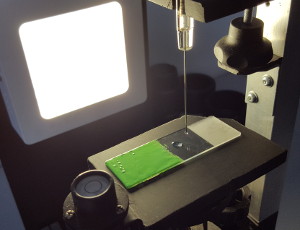
The Jagiellonian University’s Centre for Technology Transfer CITTRU has signed an agreement with InPhoCat – Innovative Photocatalytic Solutions LLC for the use of the patent Photocatalytic TiO2 coatings on the polymer surfaces activated with visible light, method of their preparation and use thereof. The company, established by JU Faculty of Chemistry scientists, will find commercial applications for their invention.
TiO2, or titanium dioxide, is a compound found in nature, commonly used as white pigment (titanium white) and has many applications in the production of things such as dyes, food, cosmetics, cement, ceramic tiles, solar cells, touchscreens and medical equipment.
Research shows that titanium dioxide exhibits photocatalytic properties, which results, among other things, in degradation of organic and microbiological contamination. Photocatalysis is a process in which the photocatalyst absorbs a specific amount of energy and induces a chemical reaction. However, TiO2 can only absorb energy from ultraviolet light, which severely limits its use. Over the last few decades, researchers have been trying to find a way to activate titanium dioxide with the use of visible light. Scientists from the JU Faculty of Chemistry have managed to invent an innovative substance that serves that very purpose, thus greatly aiding in eliminating microbiological and chemical contamination from the insides of buildings and everyday items.
The methods of titanium dioxide activation was developed chiefly by Prof. Wojciech Macyk and Dr Przemysław Łabuz. After it was confirmed that the substance successfully activates TiO2, the Jagiellonian University applied for a patent. InPhoCat, a company established in 2015 by the substance’s inventors, has recently decided to buy a licence for its commercial use. The technology was further developed, resulting in an effective activator for photocatalytic TiO2 surfaces.
Titanium dioxide surfaces provide protection from contamination for several years. The activator’s effect can be easily refreshed by reapplying it to the surface every few weeks. The agent is very effective in enclosed spaces, such as offices, elevators, train cars and other places that frequently lack UV light, but need to be kept as sterile as possible.
Titanium dioxide surfaces generate ‘reactive oxygen species’, which oxidise (and therefore neutralise) organic compounds, including harmful contaminants. They can be reliably used to disinfect tables, door handles, railings and other similar objects. This means that TiO2 surfaces coated with the InPhoCat agent greatly improves the safety of their use, a key issue in managing public spaces in this day and age.
According to the company, their product will be available on the market in late 2020.
Photograph: InPhoCat





